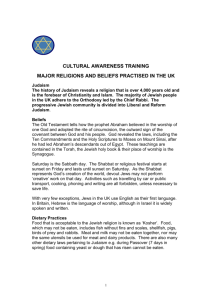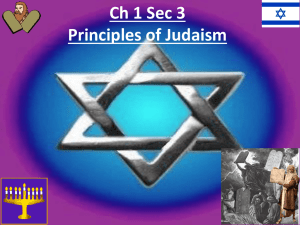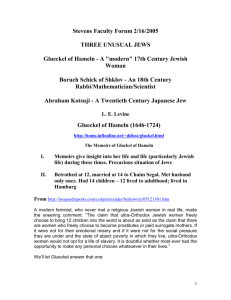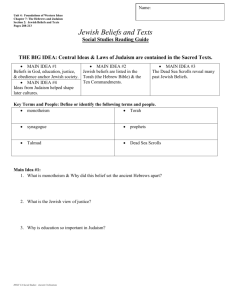Jewish culture - Children's Community Health Plan
advertisement
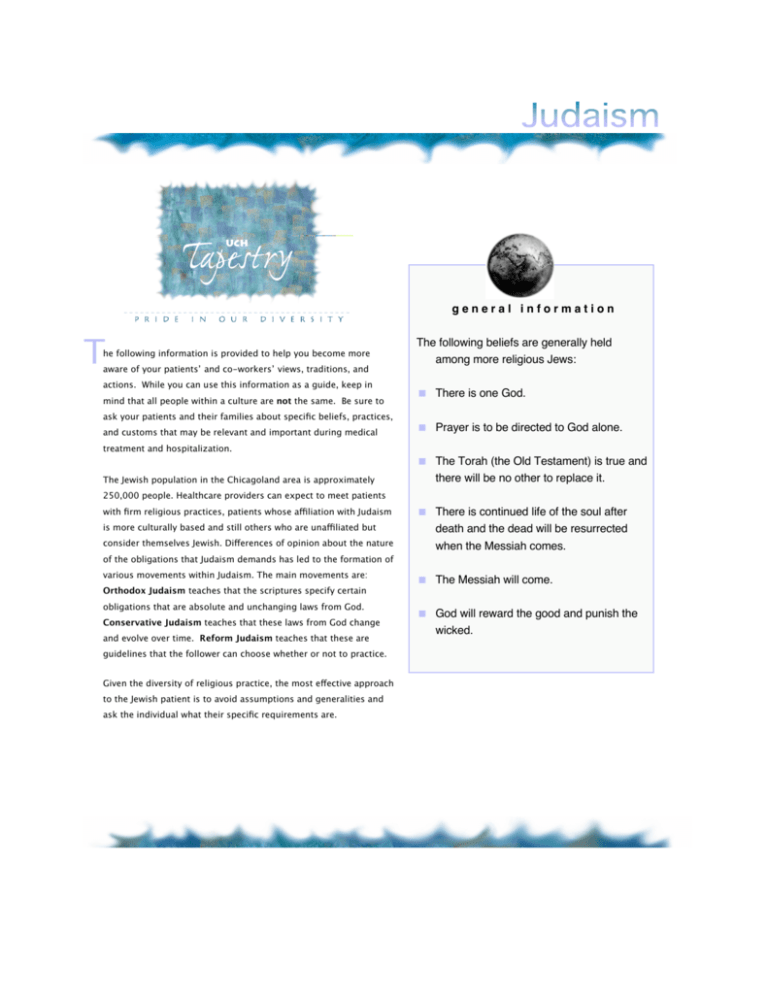
general information T he following information is provided to help you become more aware of your patients’ and co-workers’ views, traditions, and actions. While you can use this information as a guide, keep in mind that all people within a culture are not the same. Be sure to The following beliefs are generally held among more religious Jews: There is one God. ask your patients and their families about specific beliefs, practices, and customs that may be relevant and important during medical Prayer is to be directed to God alone. treatment and hospitalization. The Jewish population in the Chicagoland area is approximately The Torah (the Old Testament) is true and there will be no other to replace it. 250,000 people. Healthcare providers can expect to meet patients with firm religious practices, patients whose affiliation with Judaism is more culturally based and still others who are unaffiliated but consider themselves Jewish. Differences of opinion about the nature There is continued life of the soul after death and the dead will be resurrected when the Messiah comes. of the obligations that Judaism demands has led to the formation of various movements within Judaism. The main movements are: Orthodox Judaism teaches that the scriptures specify certain obligations that are absolute and unchanging laws from God. Conservative Judaism teaches that these laws from God change and evolve over time. Reform Judaism teaches that these are guidelines that the follower can choose whether or not to practice. Given the diversity of religious practice, the most effective approach to the Jewish patient is to avoid assumptions and generalities and ask the individual what their specific requirements are. The Messiah will come. God will reward the good and punish the wicked. treatment issues Treatment Issues In Judaism, life is valued above all else. Everything possible must be done for the patient to treat a medical condition and to preserve life. Being mindful of the person’s dignity, the least intrusive and painful treatment is the preferred one when possible. All religious obligations may be suspended- even the observance of the Sabbath - to save a life. Patients who follow more strict observances may wish to consult a Rabbi regarding treatment issues and may postpone clinical decisions until this consultation has occurred. Prevention is the highest form of healing. Healthcare professionals are held in high regard. The healing arts are accorded higher status than any other secular pursuit. If a Jewish patient follows a particular movement this may influence their needs during hospitalization. Emotions Jewish patients generally will be open in verbalizing their feelings and thoughts. There is a comfort with expressing negative feelings and real feelings to people in authority. The use of humor and irony are highly valued and can be good ways for the healthcare provider to connect with the patient. Personal Space • Religiously observant patients will require a respect for their modesty. Healthcare providers of either gender may examine patients. • Religiously observant patients will also need time and space to pray. Prayer is recognized as a most important and powerful healing tool. Patient Response to Pain Pain is taken very seriously. It is considered a meritous deed to help someone overcome his or her pain. Some religious patients may be reluctant to talk about their pain. This is less about being stoic and more about not wanting to appear ungrateful to God for their other blessings. Food Judaism has a system of food regulation called Kashrut (Kosher). Since not all Jews follow these regulations, the best approach is to ask the patient the question, “Are there any special dietary needs that you have?” For those that do, the healthcare provider will need to order a kosher diet. ν 2 inter-personal relationships Relationships Family is very important part of the Jewish culture. Patients may wish to have a family member present 24 hours a day and certainly for any discussion of treatment options. Families will tenaciously advocate for an ill family member. Judaism believes that when a person is ill, not only is the ability to take care of his physical needs compromised but also there is a risk that the individual is weakened spiritually. Therefore, it is considered a meritous deed for members of the community to visit an ill person. Visiting should be encouraged as the patient’s condition permits. Resources To obtain a Rabbi for a patient, contact the Office of Social Work and Pastoral Care and ask for the Chaplain on Call, pager #7008. Advise the chaplain that you have a patient needing a Rabbi. ν 3 The Jewish day begins at sundown and ends at nightfall. Therefore, all holidays begin at sundown of the day proceeding the holiday. Provided below is a summary of key religious holidays (this list is not all-inclusive) and implications for treatment. The healthcare provider is reminded that not all patients may observe all holidays and that levels of observance will vary from individual to individual. It is best to ask each patient about his or her specific needs. Specific holiday dates vary from year to year since the Jewish calendar is based on the lunar cycle (versus the solar cycle). Holiday Religious Significance Special Observations/ Implications For Treatment The Sabbath (Shabbat, Shabbos) The Sabbath is the holiest day in Judaism. It is primarily a day of spiritual enrichment and rest. The concept of rest goes beyond physical labor and extends to any kind of work that is creative or that exercises control or dominion over the environment. This will have an impact on the care of hospitalized religiously observant patients. Religiously observant patients will not use electricity, write, use the telephone, and therefore will not use a call light on the Sabbath. However, the laws of the Sabbath may be suspended if for any reason it jeopardizes the Welfare of the patient. Patients who observe the Sabbath will resist the suspension of these laws and counsel from a Rabbi may be required to reassure the patient. Rosh Hashanah (New Year) Rosh Hashanah commemorates the anniversary of the world. It is celebrated either one or two days, depending upon which movement of Judaism the patient follows. The holiday has many Sabbathlike restrictions. The holiday is a serious time for prayer and self-examination. The most significant observance is hearing the blowing of the shofar (a ram’s horn) during the worship Service. Yom Kippur The second holiest day of the Jewish year. Referred to as the Day of Atonement it is devoted to prayer, fasting, and repentance. Many Jews will adhere to the requirement of fasting. Orthodox Jews will keep a strict observance, Which includes restrictions on washing/bathing, the use of cosmetics such as creams, lotions, make-up, and the wearing of leather shoes. These practices are intended to shift the focus away from the physical body and onto the spiritual plane. ν 4 Holiday Religious Significance Special Observations Sukkot (Feast of Commemorates the wanderings of the Some Sabbath-like restrictions may Tabernacles) Israelites beginning with the Exodus from apply for more observant patients. Egypt, the receiving of the Torah at Mt. Sinai and the 40 years of wandering in the desert. Spiritually the holiday serves as a reminder of our transitory role in this world. Hanukkah The struggle for religious freedom and commemoration of the victory of the Jews over the Syrians in 165 BCE. The Jewish Temple was reclaimed. Purim Purim commemorates the miraculous salvation The day before Purim is a fast day. of the Jews during the 6th century BCE. Observant Jews will want to hear the reading of the book of Esther twice on the holiday. It is customary to send at least two gifts to friends on the holiday and to make a contribution to charity. Passover (Pesach) The deliverance of the Jewish people from slavery in Egypt. The Seder service on the first two evenings recounts the story of the Exodus. The holiday encourages a full exploration of the meaning of freedom-both from the historical perspective and in the context of the individual’s. Shavuot (Pentacost, Shavuos) The revelation at Mt. Sinai. The lighting of the Hanukkah menorah daily for 8 days. There is a special ceremonial meal, the seder, which is celebrated on the first nights and the last night of this eight day holiday. Any food item that is not leavened may not be consumed during the holiday. Observant Jews will require food that is made Kosher for Passover. A customary practice is the staying up the entire night of Shavuot and studying Jewish texts. It is customary to eat dairy goods on this festival. ν 5 Sources . Ellen Rosendale, Director of Social Work and Pastoral Care, University of Chicago Hospitals Rabbi David M. Rosenberg, Director, Newberger Hillel Center Health and Medicine in the Jewish Tradition, Project Ten, Institute For the Study of Health, Faith and Ethics www.everythingjewish.com www.jewfaq.org www.bnaibrith.org http://members.aol.com/Sauromalus/index.html (Jewish Medicine Home Page: Medical Ethics) www.wzo.org.il/encountr/tendays.htm ν 6


